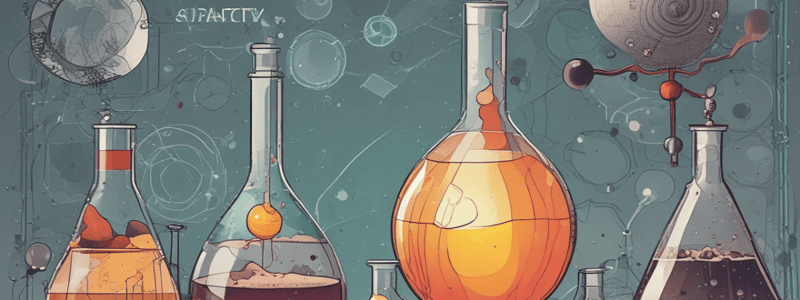Podcast
Questions and Answers
What is a common aspect of the components in a mixture?
What is a common aspect of the components in a mixture?
- They are chemically joined
- They have the same physical properties
- They retain their chemical identities (correct)
- They have different chemical properties
What is the best method for separating a solid from a liquid?
What is the best method for separating a solid from a liquid?
- Filtration (correct)
- Evaporation
- Hand sorting
- Distillation
Why is responsible waste disposal important?
Why is responsible waste disposal important?
- To reduce pollution
- To conserve natural resources
- To prevent health hazards and environmental damage (correct)
- To reduce landfills
Which industry is likely to involve chemistry?
Which industry is likely to involve chemistry?
What is a consequence of poor waste management?
What is a consequence of poor waste management?
What can be recycled?
What can be recycled?
What is a method for separating two liquids with different boiling points?
What is a method for separating two liquids with different boiling points?
What is a suitable separation method for a mixture with large items?
What is a suitable separation method for a mixture with large items?
What is a way to responsibly dispose of organic waste?
What is a way to responsibly dispose of organic waste?
What is a benefit of recycling?
What is a benefit of recycling?
Flashcards are hidden until you start studying
Study Notes
Mixtures and Separation
- A mixture consists of two or more components with different physical properties, but not chemically combined.
- Examples of mixtures:
- Soil (clay, sand, small pebbles, and plant matter)
- Suspension (clay or sand mixed with water, opaque)
- Solution (sugar mixed with water, clear)
- Emulsion (milk, mixture of water and fatty oil)
- Separating mixtures:
- Hand sorting (using senses of sight and touch, e.g., separating different types of rocks)
- Sieving (using different sizes of particles, e.g., separating stones or pebbles from sand)
- Filtration (using a filter to separate solid particles from a liquid, e.g., separating sand from water)
- Magnetic separation (using magnetic properties to separate components, e.g., separating mineral ore)
Methods of Separating Mixtures
- Evaporation:
- Separating a solution by heating the mixture to remove the liquid, leaving the solid behind (e.g., separating salt from seawater)
- Used to obtain salt in South Africa
- Distillation:
- Separating two liquids with different boiling points by evaporation and condensation (e.g., separating water and salt in seawater)
- Uses a still and a Liebig condenser
- Chromatography:
- Separating colored substances into individual pigments using a solvent (e.g., separating ink into different colors)
- Used to separate components with different properties, such as solubility and binding to paper
Recycling and Careers in Chemistry
- Recycling:
- Process of converting waste into new products
- Examples: metals, plastics, paper, and glass
- Important for reducing waste and conserving natural resources
- Careers in chemistry:
- Researcher
- Laboratory technician
- Science teacher
- Environmental chemist
- Pharmaceutical industry
- Space exploration
- Waste management
- Chemical education/teaching
Studying That Suits You
Use AI to generate personalized quizzes and flashcards to suit your learning preferences.



